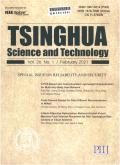CNN-Based Broad Learning for Cross-Domain Emotion Classification
IF 5.2
1区 计算机科学
Q1 COMPUTER SCIENCE, INFORMATION SYSTEMS
引用次数: 4
Abstract
Cross-domain emotion classification aims to leverage useful information in a source domain to help predict emotion polarity in a target domain in a unsupervised or semi-supervised manner. Due to the domain discrepancy, an emotion classifier trained on source domain may not work well on target domain. Many researchers have focused on traditional cross-domain sentiment classification, which is coarse-grained emotion classification. However, the problem of emotion classification for cross-domain is rarely involved. In this paper, we propose a method, called convolutional neural network (CNN) based broad learning, for cross-domain emotion classification by combining the strength of CNN and broad learning. We first utilized CNN to extract domain-invariant and domain-specific features simultaneously, so as to train two more efficient classifiers by employing broad learning. Then, to take advantage of these two classifiers, we designed a co-training model to boost together for them. Finally, we conducted comparative experiments on four datasets for verifying the effectiveness of our proposed method. The experimental results show that the proposed method can improve the performance of emotion classification more effectively than those baseline methods.基于CNN的跨领域情感分类广义学习
:跨领域情绪分类旨在利用源领域中的有用信息,以无监督或半监督的方式帮助预测目标领域中的情绪极性。由于领域差异,在源领域训练的情绪分类器在目标领域可能无法很好地工作。许多研究人员专注于传统的跨领域情感分类,这是一种粗粒度的情感分类。然而,跨领域的情感分类问题很少涉及。在本文中,我们提出了一种称为基于卷积神经网络(CNN)的广泛学习的方法,通过结合CNN和广泛学习的优势来进行跨领域情感分类。我们首先利用CNN同时提取领域不变和领域特定特征,以便通过广泛学习来训练两个更有效的分类器。然后,为了利用这两个类别,我们设计了一个共同训练模型,为他们共同提升。最后,我们在四个数据集上进行了比较实验,以验证我们提出的方法的有效性。实验结果表明,与基线方法相比,该方法可以更有效地提高情绪分类的性能。
本文章由计算机程序翻译,如有差异,请以英文原文为准。
求助全文
约1分钟内获得全文
求助全文

 求助内容:
求助内容: 应助结果提醒方式:
应助结果提醒方式:


